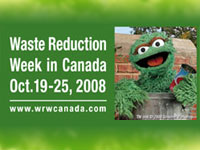Lean Mean Trash Machine
 Some think he’s cute - almost adorable. But in fact, he’s a grouchy curmudgeon that lives in a garbage can and eats the trash that we throw away with reckless abandon - trash that otherwise could be turned into gold.
Some think he’s cute - almost adorable. But in fact, he’s a grouchy curmudgeon that lives in a garbage can and eats the trash that we throw away with reckless abandon - trash that otherwise could be turned into gold.Sesame Street’s beloved Oscar the Grouch has teamed up with Waste Reduction Week in Canada (WRW) to promote ‘waste-free’ goals that will appeal to children and adults alike through a media campaign running from October 19-25, 2008.
"I can’t think of anyone better to represent the need for increased waste reduction and recycling than Oscar the Grouch," said Jo-Anne St. Godard, member of the National Committee for WRW and the Recycling Council of Ontario’s Executive Director. "Oscar is one of the most beloved television personalities. His broad appeal will elevate Waste Reduction Week to new heights and help get everyone excited about doing their part."

Canada’s 8th annual Waste Reduction Week is developed and run by a coalition of waste reduction and conservation organizations from across the country. The program urges everyone to do their part by reducing, reusing and recycling every aspect of their lives - at home, school and work.
And while there is a light, almost playful jolliness to the WRW campaign, the issue is anything but funny. Reducing unnecessary waste is a serious business and could well become the deciding factor between companies that fail and those that survive.
The price of waste
Excess waste cost taxpayers as community landfills fill to capacity and waste disposal costs rise. It also represents a significant cost for business. In these days of high energy costs, it is more important than ever for companies to find innovative ways to decrease the volumes and costs of their solid waste disposal.
The economic advantages are obvious: reduced waste disposal fees, savings in material and supply costs, revenues from marketing reusable materials and savings from more efficient work practices.
But there are other tangible advantages as well. An environmentally conscious company can attract consumers who consider a firm’s environmental record when making purchasing decisions. A company can also benefit from higher productivity through improved employee morale and lower costs because of its compliance with local solid waste regulations.
An excellent example of how to earn environmental credits in the consumer market is an initiative launched in Ontario by retail giant Canadian Tire. As part of its ongoing commitment to providing customers with eco-friendly products and services, Canadian Tire with support from the Ontario Power Authority (OPA) is rewarding Ontarians for recycling their used air conditioners, dehumidifiers and halogen lamps. The Rewards for Recycling program takes place at Canadian Tire stores across Ontario the weekends of October 18th and 19th and October 25th and 26th. Residents who return a used air conditioning unit or dehumidifier will receive a $25 gift card, while those returning a halogen floor lamp will be rewarded with a $10 gift card.
The Rewards for Recycling program will not only divert close to 90 truckloads of product from landfill, but will also result in total gross energy savings of approximately 10.38 million KWh, an estimated equivalent of the total consumption of over 12,200 households.
Other ways for a company to reduce waste include: introducing recycling initiatives and educating staff accordingly; instituting recycling initiatives for customers and suppliers; using recycled materials where possible; greening the company’s supply chain by using only environmentally aware suppliers; reducing the company’s carbon footprint by encouraging energy efficiency and environmental awareness in the workplace; and communicating about the importance of good environmental performance to employees and managers.
Starving Oscar
Oscar loves trashy food and this is another area where change is needed. A new International Facility Management Association (IFMA) survey - "Green Practices 2008" - shows that while recycling and energy conservation initiatives are being practiced by the vast majority of facility practitioners, much more can be done - particularly in the food service industry.
"Food service is perhaps one of the least explored aspects of sustainability, yet it can impact virtually hundreds of thousands of people," said Teena Shouse, CFM, senior FM consultant at Facility Engineering Associates, who also speaks and teaches on food service sustainability.
"Whether it is simply reducing disposables or significantly changing the behavior of the customers and the practices of the food service providers, there is a huge opportunity here that is cost effective to investigate and to respond to."
The survey notes that in addition to recycling and changes in packaging, facility managers are turning to sustainable purchasing, such as reducing shipping distance for food products, and tray-less cafeterias, which discourage excess waste.
How to become a Grouch
Lastly, keep in mind that being mean is not all bad. According to Sesame Street Magazine, October 15th is National Grouch Day – a day for all Grouches to celebrate their way of life.
A Grouch’s mission in life is to be as miserable and grouchy as possible, and pass that feeling on to everyone else. With respect to reducing waste, perhaps every CEO should pencil into their personal diaries to make October 15th the day they get lean and mean about reducing waste.
About WRW in Canada
WRW is developed and delivered by a coalition of 13 different recycling councils and sister organizations from across the country. The Program focuses on the 3Es of the 3Rs; Education, Engagement and Empowerment. The program’s educational resources and "take action" messaging, empowers individuals and businesses to adopt more environmentally conscious choices. Through a dynamic and user-friendly website WRW provides information and ideas that can help companies large and small to reduce waste in all facets of their operations.For More Information: wrwcanada.com
You can return to the main Market News page, or press the Back button on your browser.

